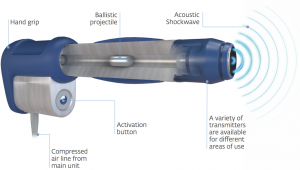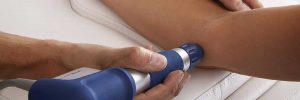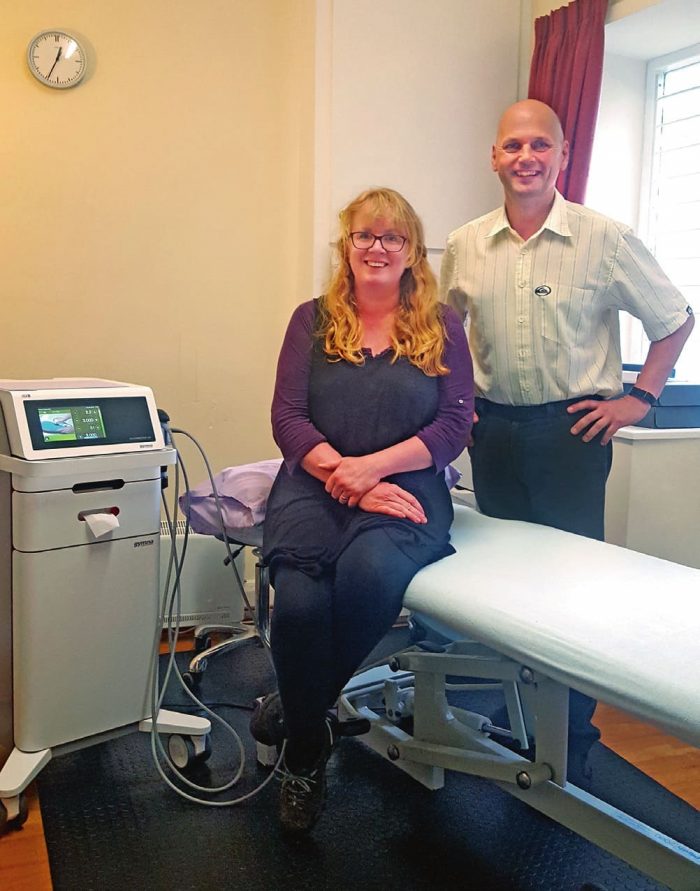Shockwave Therapy
Shockwave Therapy is a revolutionary non-invasive treatment for a wide range of stubborn conditions.
What is Shockwave Therapy?
Buxton Osteopathy Clinic has now invested in new revolutionary Shockwave Therapy. We have made this decision because there is a growing body of good quality clinical evidence that underpins this new exciting technology. This is consistent with our mandate to offer our patients the best possible treatment outcomes using modalities supported by best clinical evidence.
Shockwave Therapy is the most advanced non-surgical and non-invasive treatment available for a wide range of stubborn conditions that are difficult to treat using a conventional treatment approach. Shockwave Therapy will preclude the need for steroid injections and invasive surgeries and enable rapid relief from your pain.
Book your Shockwave Therapy consultation
Book nowHow Shockwave Therapy works
Shockwave Therapy is correctly termed Extracorporeal Shockwave Therapy (ESWT). This new revolutionary technology passes shockwaves through the skin to the injured part of your body. These high-speed shockwaves are generated by compressed air and are applied using a handheld applicator.
Shockwave Therapy works by increasing blood flow to the injured area, stimulating cell regeneration and healing and decreasing local factors which can cause pain.
Does Shockwave Therapy cause any pain?
Most patients experience mild discomfort during treatment, but it is generally well tolerated. The initial discomfort typically fades as the area becomes desensitised as it is being treated. We will adjust the intensity of stimulus depending on your comfort level, and can gradually ramp it up to minimise discomfort.
Shockwave Therapy purposefully creates an inflammatory response in injured soft tissue, so you may also experience mild discomfort following treatment. Patients should not apply ice or take anti-inflammatories after Shockwave treatment, as this inflammatory healing response shouldn’t be reduced.
What does Shockwave Therapy treat?
Shockwave Therapy is an effective tool for a wide range of stubborn soft tissue conditions such as chronic tendon problems (or tendinopathies) and bony conditions. These are often difficult to treat using conventional approaches.
Here are some examples of conditions where Shockwave Therapy has effectively treated and restored normal function:
- Plantar fasciitis (heel pain)
- Shoulder pain, e.g. calcific lesions and tendon related symptoms of the rotator cuff and bony spurs
- Lateral epicondylitis (tennis elbow)
- Medial epicondylitis (golfer‘s elbow)
- Patellar tendinitis (jumper‘s knee)
- Tibial stress syndrome (shin pain)
- Achilles tendinitis
- Hip pain
- Heel pain and heel spurs
- Chronic neck dysfunction
Case study – how Shockwave Therapy saved Sandra from chronic foot pain
Acclaimed Buxton landscape artist Sandra finds inspiration for her work by hiking into the Peak District hills. But her painting expeditions had been curtailed for many months due to a crippling pain in her foot.
The condition, caused by an inflamed tendon, has also made everyday activities like walking the dogs a testing experience. But now she’s on the road to recovery, thanks to a new therapy at Buxton Osteopathy Clinic.
Shockwave Therapy is recommended by NICE – the National Institute for Health and Care Excellence – for the treatment for a range of conditions. And it’s got Sandra walking again.
“I’ve had a problem with my foot for getting on for a year. It’s really painful – like standing on a three-pin plug all the time,” she says. “I’ve been to the podiatry clinic, tried exercises and worn inserts in my shoes. None of it made any difference.”
Then one day she mentioned her problem to osteopath Phil Heler during a visit to the clinic for back treatment. He suggested that Shockwave Therapy might help. Sandra did some research and found widespread evidence of its effectiveness.
Officially termed Extracorporeal Shockwave Therapy (ESWT), the new technology passes shockwaves through the skin to the injured part of the body. The high-speed shockwaves are generated by compressed air and applied using a hand-held applicator.
The Shockwave Therapy has had a dramatic impact on Sandra’s condition: “I’ve had five treatments so far and it has made a massive difference – it’s quite incredible,” she says. “For the first couple of sessions it felt worse, if anything, but I think that’s part of the process. Then I started to feel the difference; I’ve gone from hobbling everywhere to being almost pain-free. I’m confident I’ll be able to return to normal exercise in the next few weeks.”
Phil says the clinic decided to invest in the therapy as part of its mandate to offer patients the most effective treatments, supported by hard evidence. “We have made this decision because there is a growing body of good quality clinical evidence that underpins this new exciting technology,” he adds.
“Shockwave Therapy is the most advanced non-surgical and non-invasive treatment available for a wide range of stubborn conditions that are difficult to treat using a conventional treatment approach. It precludes the need for steroid injections and invasive surgeries and enables rapid relief from your pain.”
How successful is Shockwave Therapy?
Shockwave Therapy is one of the most widely researched rehabilitation modalities, with increasing numbers of scientific studies added each year. The majority of research validates the effectiveness of extracorporeal shockwave, and shows successful treatment rates of up to 90%!
After only 3 or 4 treatments with Shockwave Therapy, most patients report a significant reduction of pain and regaining of normal function.
Shockwave Therapy is so effective it is now recommended by the National Institute for Health and Clinical Excellence (NICE). NICE is an independent body set up in 1999 in order to provide the best evidence-based guidance and advice based on research and evidence about which treatments are most effective.
There are now Nice Guidelines on Extracorporeal Shockwave Therapy (click on the links below to view the guidelines):
- Shockwave Therapy for Trochanteric Pain (Hip)
- Shockwave for Achilles (Heel)
- Shockwave Therapy for Tennis Elbow
- Shockwave Therapy for Calcific Tendonitis of the Shoulder
In addition, here are further research papers on the effectiveness of Shockwave Therapy:
- Shockwave Therapy for soft tissue injuries (ESWT)
- EPAT for Trigger Points and Myofascial Conditions in Sport Medicine (Robert Gordon, M.D. & Chris Broadhurst, M.D.)
- Heal pain treatment results using EPAT vs ESWT
- Extra-corporeal Pulsed-activated Therapy (“EPAT” Sound Wave) for Achilles Tendinopathy
- Ultrasonographic Evaluation of Low Energy Extracorporeal Pulse Activated Therapy (EPAT) for Chronic Plantar Fasciitis


